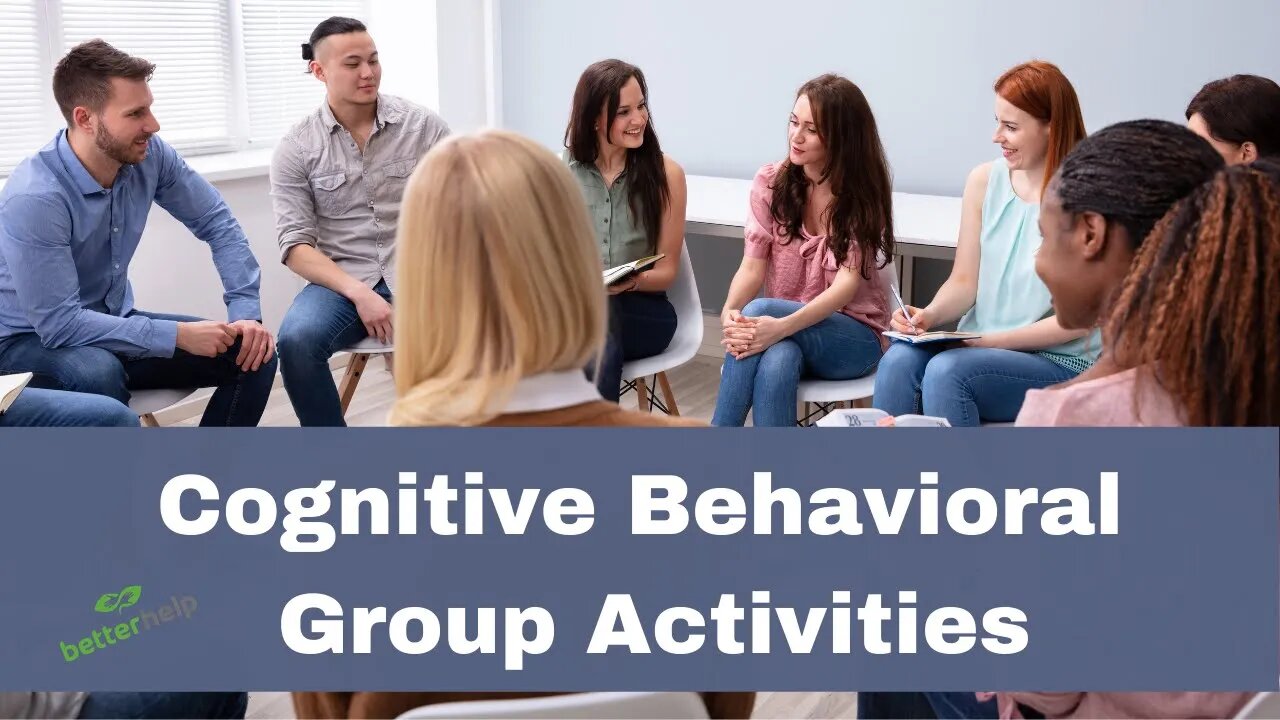Premium Only Content

Cognitive Behavioral Therapy Group Activities | CBT Therapist Aid
Cognitive Behavioral Therapy Group Activities | CBT Therapist Aid
#CBT #cognitivebehavioral #Betterhelpcbt
Sponsored by BetterHelp. Clinicians, sign up with BetterHelp to increase your bookings and work from the comfort of your own home. https://hasofferstracking.betterhelp.com/aff_c?offer_id=20&aff_id=2373
CBT Interventions
Group Activities
Instructor: Dr. Dawn-Elise Snipes PhD, LPC-MHSP, LMHC
Executive Director: AllCEUs Counseling CEUs and Specialty Certificates
Podcast Host: Counselor Toolbox, Happiness Isn’t Brain Surgery
Objectives
- Explore ways to teach Cognitive behavioral interventions in group
Basis
- Changing thoughts (cognitions) has a direct impact on physiological response (urges and behaviors)
- Changing behaviors has a direct response on thoughts and emotional reactions
- At its core CBT has the principles of noticing, understanding and addressing thoughts feelings and behaviors
Functional Analysis
- The process of identifying the antecedents (causes/triggers) and consequences (positive/negative) of behaviors
- Causes
- Emotional
- Mental
- Physical
- Social
- Environmental (including time & Date)
Problem Identification and Solving
- Stop. Use self talk, distress tolerance and/or relaxation techniques to restrain impulsive actions
- Identify the problem—Who, where, what, why
- Develop alternative solutions
- Explore the short and long term consequences/outcomes of solutions
- Choose a response
- Evaluate the outcome
Contracting
- Identify the problem/target behavior
- Identify a new behavior to replace it
- Identify rewards
- Write a contract
- Monitor behavior
Cognitive Distortions
- Personalization
- Taking everything personally---Its your fault. It was meant to hurt you.
- Exaggeration
- Making a mountain out of a molehill or seeing the worst-case scenario
- All-or-Nothing
- Viewing things in dichotomous terms
- Availability Heuristic
- Noticing what is most prominent in your mind
Cognitive Distortions
- Minimization
- Not giving credit where credit is due
- When you do good things
- When other factors are involved
- Selective Abstraction
- Seeing only what fits your mood/perspective
ABC-DE
- A=Activating Event
- B=Automatic Beliefs
- C=Consequences
- D=Dispute automatic beliefs
- E=Evaluate effectiveness of reactions
Cognitive Restructuring
- Literally changing your thoughts
- Find meaning in the current event
- Challenge the interpretation
- Develop a both/and perspective
- Examples of restructuring (Have clients give examples and practice)
- Threat vs. challenge (Interview, public speaking)
- Failure vs. learning experience (Relationships, hobby)
- Loss vs. opportunity (Job, relationship)
- Powerless vs. empowered (Forgiveness)
Systematic Desensitization
- Learning to effectively use coping skills to reduce distress through gradual exposure
- Levels
- Level 1: Imagine and describe the distressing event
- Level 2: Expose yourself, at a safe distance, to the distressing event
- Level 3: Experience the distressing event
- Process
- For each level, rate distress on a scale from 1-5.
- Use skills of choice to reduce your distress until you are at a 1.
- Practice until you can think about the event without getting distressed.
Cognitive Processing Therapy
- Using analytical questions to help identify cognitive errors and make more effective choices
- Questions
- What is the evidence for and against?
- Is this based on facts or feelings?
- Are all aspects of the situation being considered?
- Are you using all or nothing terms?
- Are you confusing high and low probability events?
- What is the most logical course of action?
- Example: Anxiety about heart attack/dying
Acceptance and Commitment
- Accepting reality as it is and committing to choosing thoughts and behaviors which will help you move toward a rich and meaningful life
- Commitment
- Determination to improve the next moment
- Realization that there are multiple aspects to commit to in your rich and meaningful life
Summary
- There are a variety of ways to help people explore and address the thoughts which may be keeping them stuck.
- Some techniques will work better in certain situations
- Since cognition is based on prior experiences, teaching CBT in group can help clients explore alternate interpretations and information in similar situations
- By developing a broader understanding of situations people can explore the effectiveness of their thinking in terms of how it impacts their ability to live a rich and meaningful life.
Video by Dr. Dawn Elise Snipes on integrative behavioral health approaches including counseling techniques and skills for improving mental health and reducing mental illness.
-
 2:40
2:40
DocSnipes
1 year agoWhy SMART Goal Setting Doesn't Work
172 -
 LIVE
LIVE
vivafrei
5 hours agoFined $28,000 for Going in the Forest! Live with Jeff Evely! AND MORE!
5,649 watching -
 LIVE
LIVE
The Quartering
1 hour agoToday's Breaking News With Hannah Claire, Luke Rudkowski & Guest Harrison Smith From InfoWars!
13,752 watching -
 1:35:34
1:35:34
Tucker Carlson
2 hours agoHere’s What It’s Really Like to Live as a Christian in the Holy Land
34.5K58 -
 LIVE
LIVE
Dr Disrespect
3 hours ago🔴LIVE - DON DISRESPECTO - MAFIA OLD COUNTRY - OFFICIAL GAMEPLAY
2,108 watching -
 DVR
DVR
Nerdrotic
5 hours ago $2.40 earnedNerdrotic Nooner 506
35.3K -
 51:18
51:18
Matt Kohrs
2 hours agoRumble Recap: Big Things Coming w/ CEO Chris Pavlovski
61.1K6 -
 LIVE
LIVE
Jeff Ahern
1 hour agoMonday Madness with Jeff Ahern
71 watching -
 11:52
11:52
TheRoyaltyAutoService
13 days agoClient Didn’t Believe The Dealership When They Told Her It Needed Rear Brake Calipers…
6 -
 53:14
53:14
Sean Unpaved
2 hours agoFirst Snaps & Two-Way Stars: QB Debuts and Hunter's NFL Fit
14K